Spring/Summer 2022 Davidson Journal Magazine. June 17, 2022.
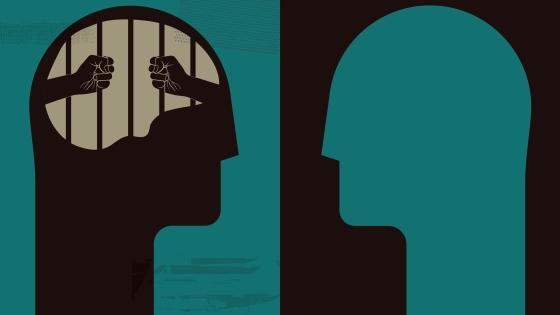
“By playing an active role, man enters into a spiritual relationship with this world that is quite different: he does not see his existence in isolation. On the contrary, he is united with the lives that surround him; he experiences the destinies of others as his own.” – Albert Schweitzer, M.D., Out of My Life and Thought: An Autobiography
It’s Thanksgiving in maximum-security.
A young doctor, his wife and their two little kids take their shoes off and a prison guard pats them down. The loud “clink” of the locking door startles them.
They’re here to visit Vince Gilmer, once a beloved family physician at a rural North Carolina clinic. The younger doctor, Benjamin Gilmer ’92, works at the very same clinic. Despite the last name, they’re not related.
It’s the first time Benjamin’s family is meeting Vince. It’s also his daughter’s fourth birthday and she’s confused about why they’re spending it here. There’s no Thanksgiving turkey or stuffing, no birthday cake or balloons—just rough gray cinder block walls and thick glass doors.
The older “Dr. Vince” is in what the birthday girl calls a “time out.” He’s serving a life sentence for murder.
Vince gives them each a big hug and tells them how happy he is to see them. They spend the afternoon playing Uno and feasting on prison vending machine Snickers bars, pork rinds and Mountain Dew. The five of them pose for a “family” picture.
Not your typical holiday tableau. But then, Benjamin Gilmer doesn’t really do typical.
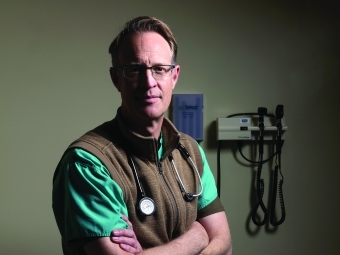
Seize the Day
“Eventually all things fall into place. Until then, laugh at the confusion, live for the moments and know everything happens for a reason.” —Albert Schweitzer, M.D.
Benjamin Gilmer always wanted to be a doctor, but never to the exclusion of adventure. His loved ones describe a big-hearted, open-minded visionary with a penchant for magical thinking.
And persistence.
He coasted through an undemanding high school in western Tennessee and arrived at Davidson College as an underdog among elite prep school kids. He struggled academically and landed in the “reject French class.” He later taught French.
The first college English paper he turned in oozed with a professor’s red ink. He got a C-minus in the class; he’s now an acclaimed author.
Numerous medical schools rejected him. He’s now a respected doctor who also teaches medicine and holds tight to the “reverence for life” philosophy of the late Albert Schweitzer, a Nobel Peace Prize-winning physician, musician and humanitarian.
Schweitzer started medical school when he was 31; Benjamin Gilmer also took a circuitous route to the practice of medicine.
He had a lot of fun along the way.
In college, he led trips for Davidson Outdoors. He thrived on meeting and bringing people with different backgrounds and personalities together. He loved parties and music. He’s someone who’d lobby friends to drive to a Thursday night concert in another city—say Indianapolis. If any mentioned the need to be in class or at work on Friday morning, he’d have an answer like: “Don’t worry, we’ll be back in time.”
And he always appreciated a good laugh, like when he gathered hallmates for a fake séance—with chants and incense—as a group of prospective students and their parents toured the Belk dormitory.
“I imagine Davidson lost some potential students when they walked into what looked like a big hippie fest,” his brother Nate Gilmer ’96 says wryly. “Then again, maybe they gained a few.”
Remember the 1980s movie Ferris Bueller’s Day Off? Ferris is the fun-seeking, you-only-live-once teenager who defies rules set by hapless adults.
“Benjamin channels his inner Ferris,” Nate Gilmer, now a Nashville attorney, says. “He’s this carpe diem guy not completely bound by expectations or what’s practical. He wants to go to med school but doesn’t let that stop him from having a great time in college—when maybe he should be studying a bit more. Doesn’t stop him from moving to France after graduation. I was Cameron, always following the rules. I was always annoyed and a little impressed about what he got away with.”
Benjamin was the little kid who thought he could fly—down a steep flight of steps—and miraculously landed unharmed at the bottom. (He later took up paragliding.)
“He was always such a love,” says his mom, Day Kennon. “He was always bright and happy and ready for a new adventure. He met people and made friends so easily; he’s probably the most positive person I’ve ever known.
“Wherever Benjamin goes there are these interesting connections, this serendipitous stuff happens along the way,” she says. “It’s like Benjamin has this little golden cloud over his head.”
Vince Gilmer’s mother, Gloria Hitt, sees a halo.
“If you’re talking to Dr. Ben,” she says. “You’re talking to one of God’s angels.”
Wide-eyed World View
“The true worth of a man is not to be found in man himself, but in the colors and textures that come alive in others.” —Albert Schweitzer, M.D
College friends describe Benjamin Gilmer and his propensity for landing in unexpected situations in almost mythical terms.
As a Davidson senior, he and another student vied for a post-graduate fellowship in France. The professor figured a coin toss offered a fair solution and flipped a quarter that rolled down a Chambers hallway and landed on heads. Benjamin won.
Years later as he and a group of medical residents ate at the 12 Bones barbecue restaurant in Asheville, then-aspiring presidential candidate Barack Obama stopped in. A photo of Gilmer and Obama talking appeared the next day in the local newspaper.
When he started looking into the mystery of how Vince Gilmer, a beloved doctor, could commit a brutal murder, a well-known National Public Radio show reporter working on a story about coincidences contacted him. In 2013, millions heard the story of “Dr. Gilmer and Mr. Hyde” on NPR’s This American Life.
In March, Benjamin Gilmer’s memoir, The Other Doctor Gilmer, came out to rave reviews from critics and bestselling authors such as Atul Gawande (Being Mortal), and Wiley Cash (When Ghosts Come Home). Gilmer’s book topped the bestseller charts in the mental health and medical mystery categories. And Jennifer Fox, director of HBO’s The Tale, is adapting a film based on the book.
“I was always in awe of the things that happened to him,” says Jim Weaver ’91, a fellow Asheville doctor and close friend. “He’s got this wide-eyed, open-armed way of viewing life and people, and good things come from that. As one of our colleagues says, ‘the guy doesn’t have a mean bone in his body.’”
Weaver, who transferred to Davidson as a sophomore, remembers feeling like an outsider before meeting Gilmer.
“His friendship, and his believing the best of you is a powerful thing when you’re an awkward college kid, and as an adult,” Weaver says. “Good things happen to him because he’s a really good person. He’s always going to give people the benefit of the doubt.”
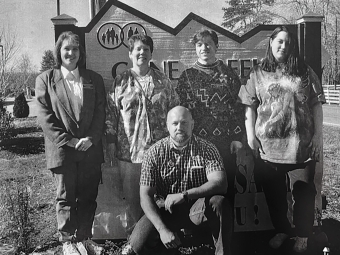
Connecting Coincidences
“Every start on an untrodden path is a venture which only in unusual circumstances looks sensible and likely to succeed.” —Albert Schweitzer, M.D.
Few gave the other Dr. Gilmer that benefit after learning of his crime.
On June 28, 2004, Vince Gilmer picked up his ailing, 60-year-old father from Broughton Hospital, a psychiatric facility in western North Carolina. They took off for a long drive through the Virginia mountains. At some point Vince Gilmer stopped his truck, strangled Dalton Gilmer with a rope, cut his fingers off with pruning shears and dumped the body.
He went to work the next day.
Detectives quickly pegged him as his father’s killer and arrested him days later as he hid out in a patch of woods. A jury found him guilty of first-degree murder after a bizarre trial where he represented himself and declared himself an expert witness.
Investigators and the presiding judge saw Vince Gilmer as ruthless, deceptive and dangerous. And completely lacking remorse.
“Mr. Gilmer, the jury found you to be a cold-blooded killer,” the judge said as he imposed a life sentence. “I think the evidence supports that finding.”
After his arrest, the clinic he founded closed for a few years, then re-opened as a Mountain Area Health Education Center (MAHEC) facility.
Benjamin Gilmer finished medical school in 2005 with a load of debt and began a family medicine residency with MAHEC in Asheville. In 2009, he learned of an opening at a small rural clinic nearby, got the job offer within an hour of the final interviews, “and started my career as a doctor following in the footsteps of a murderer with my name.”
Vince Gilmer and his ex-wife had started the Cane Creek Family Health Center to provide medical care in an underserved area. He lived the life of a benevolent country doctor; patients described him as a big, gentle guy who listened, empathized and cared. People called him Bear, as in teddy bear.
He didn’t turn people away when they had no insurance or money. At least one patient paid his bills in vegetables. When mice got into the clinic, he set non-lethal traps then freed them outside.
“He couldn’t stand it when he saw a butterfly hit by a car,” Vince’s mom says. “He tried to save everything and everybody.”
Jason Boyer was in his early 20s when he talked to Vince Gilmer about experiencing depression.
“He helped me overcome that stigma that so many people have, that you’re weak if you talk about it,” Boyer says. “Too many doctors don’t understand mental health issues. Bear did. He was a wonderful doctor.”
Vince Gilmer saw first-hand how untreated mental illness could ravage a family.
His father, Dalton, a U.S. Army Vietnam War veteran diagnosed with schizophrenia, would snap from calmness to violent, alcohol-fueled rages. Dalton Gilmer tortured his wife, and once after being hospitalized, she ended up in a women’s shelter. After their divorce, he exhibited delusional behavior, abused drugs, and sometimes ended up on the streets.
Benjamin Gilmer knew about Vince’s murder conviction before he took the job as his replacement. The doctors who interviewed him warned that the Gilmer name could cause confusion. Indeed, some patients scheduling appointments thought “Dr. Gilmer” was Vince.
As they got to know Benjamin, they opened up about Vince. Like Benjamin, Vince Gilmer had found joy in music, socializing and healing people. Patients talked so fondly about him that Benjamin became fixated. The more he learned, the more he drew connections to Vince.
“It got to the point,” Benjamin says, “Where I felt like I was a continuation of him.”
More coincidences: Benjamin’s first medical school rotation was at Broughton Hospital when Dalton Gilmer was a patient. Benjamin was 39 when he started his job at the Cane Creek clinic; Vince was 39 when he killed his father. A few weeks after the murder, Benjamin’s father, an Episcopal priest, presided over his wedding to Deirdre Smith on a mountaintop just a short drive from where Dalton Gilmer’s body was found.
Benjamin Gilmer grew terrified that Vince would get out of prison and blame him for taking his job—after a patient told him just that. He lost sleep, compulsively checked locked windows and doors and considered buying a gun. Some friends and family members warned him that he was taking a big risk.
“Get out of there,” Benjamin Gilmer recalls his brother Barrett Gilmer ’00 urging him. “Move to Charlotte or Nashville…think about your future. Think about your family. You need to put some serious distance between yourself and him—now.”
Instead, Benjamin Gilmer’s fears evolved into what’s become a decade-long journey to help Vince.
Sarah Koenig, then a reporter/producer with This American Life, heard about the two Dr. Gilmers from Benjamin’s cousin. In 2012, she and Benjamin Gilmer joined forces in what turned into an investigation of why Vince killed his father.
They visited him in prison, which started ongoing conversations. Benjamin came to believe that Vince, who appeared battered, confused and in desperate need of treatment, belonged in a hospital, not prison.
“He’s always had an altruistic approach to life. He follows his impulses,” says Benjamin’s father, Lyonel Gilmer. “Something will gnaw and gnaw at him until he does what he feels like he needs to do. It would have been simple for him to visit Vince and end it there. But he doesn’t have it in him to walk away from something like that.”
That doggedness got results.
“It was his curiosity and persistence and compassion that led to a diagnosis for Vince,” says Koenig, now a producer of the popular “Serial” podcast. “After a certain point I was more or less ready to kind of shrug and say, ‘I guess we’ll never know.’ Benjamin—he does not take ‘I guess we’ll never know’ for an answer.’”
Benjamin details his research in The Other Dr. Gilmer, where he reveals how trauma from years of abuse combined with the effects of an undiagnosed, rare disease, could have led to Vince’s actions. Huntington’s, an inherited neurodegenerative disease, causes the progressive breakdown of nerve cells in the brain—there is no cure.
After eight years of pursuing multiple clemency appeals, in January, then-departing Virginia Governor Ralph Northam, who originally denied Benjamin and a legal team’s pleas to pardon Vince Gilmer, changed his mind. Perhaps it was after reading an early copy of The Other Dr. Gilmer?
Benjamin Gilmer now serves as Vince Gilmer’s legal guardian and is seeking a mental health facility that can treat him. Despite the governor’s pardon, Vince remains in prison.
Benjamin Gilmer hopes that his book will help people see that all humans share a mutual “cognitive fallibility.” He says understanding that is essential for reframing crime and punishment. He believes society should look upstream and “heal crime.”
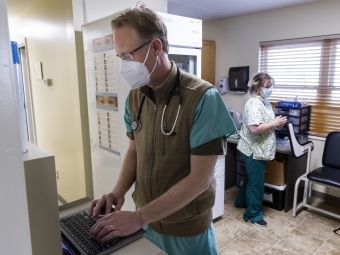
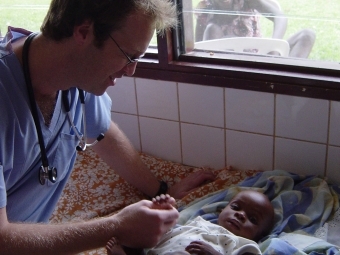
Taking the Roundabout Route
“The result of the voyage does not depend on the speed of the ship, but on whether or not it keeps a true course.” —Albert Schweitzer, M.D.
Benjamin Gilmer didn’t follow the traditional straight and focused path to becoming a doctor, nor to being the kind of doctor he is today.
His parents divorced when he was four. Lyonel Gilmer later served as the chaplain at what’s now Atrium Health Carolinas Medical Center in Charlotte. Benjamin worked high school summers there, first in the cafeteria, then as an emergency department assistant. During and after college, he worked as a neurotoxicology research assistant.
Fresh out of Davidson, he spent a year on a French government fellowship teaching high school in Paris. He didn’t want to leave when that ended and convinced program leaders—in fluent French—to let him teach another year.
He toured Europe on a motorcycle, made friends from around the world, and took medical school classes at the Sorbonne. He returned to the United States and taught high school French and neurobiology in Charlotte.
Fun aside, an underlying seriousness existed.
He had a fascination with the human brain and conducted Alzheimer’s disease research at Davidson with Julio Ramirez, R. Stuart Dickson Professor of Psychology. He later earned a master’s degree in neurotoxicology from UNC Charlotte and worked in research with former North Carolina Governor Jim Martin ’57. (Martin, who also once taught chemistry at Davidson, later worked for the hospital system.)
Gilmer majored in neurobiology, with concentrations in French and religion. Science classes and research gave him a strong foundation for a medical career. He says Davidson’s emphasis on a broad liberal arts experience opened the world to him: “It was a moral education that has informed me deeply.”
He had a strong curiosity about different cultures, traditions and beliefs.
“He was a joy to teach,” says Bill Mahony, Charles A. Dana Professor of Religion. “He had a great sense of humor, this sort of bemusement. And always this sense of wonderment—that ‘can we talk a little more about this, can we go deeper’?
“He’s fascinated with people and their ideas—he listens with real gentleness, never harshness. He was always very empathetic, and very compassionate. I could see that in him as a student and now as a doctor, I see that even more deeply.”
Getting into medical school came after multiple rejections, and two rounds of MCATS and essays. He started East Carolina’s Brody School of Medicine at 32.
In his third year of medical school, he was awarded an International Albert Schweitzer Fellowship in Gabon, Africa. He treated some of the world’s most poverty-stricken people for conditions ranging from HIV to cancer; malaria to malnutrition; and machete wounds to crocodile bites. After seeing countless children die from conditions of poverty and malaria, he felt helpless—and angry.
“The child died at the age of four because he was born a Gabonais; he had absolutely no choice in the outcome,” he wrote about one case. “How long until we realize that healthcare is not a privilege but a basic human right?”
He left Gabon determined to become a primary care doctor in an underserved community.
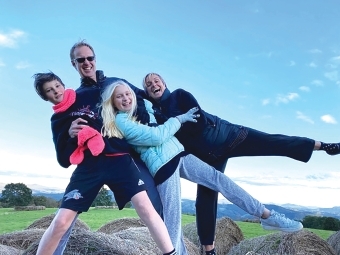
Channeling Schweitzer
“Search and see if there is not some place where you can invest your humanity.” —Albert Schweitzer, M.D.
Now a seasoned doctor, Benjamin Gilmer visits Davidson College each spring to recruit students to join him in rural Honduras for a mission called Shoulder to Shoulder, which he has been part of since 2005.
Davidson students work alongside medical students and family medicine doctors, who hope to inspire them to pursue primary care.
He had just talked with Davidson students in March of 2020 when they learned the college was sending them home because of the COVID-19 pandemic. Moments later, Gilmer got a call letting him know that publishing giant Penguin Random House wanted his book.
“I went out and laid in the grass in front of Chambers with joyous tears,” he says. “Not being able to curtail my excitement, I ran into Chambers to share the news with Bill Mahony. It was a magical moment.”
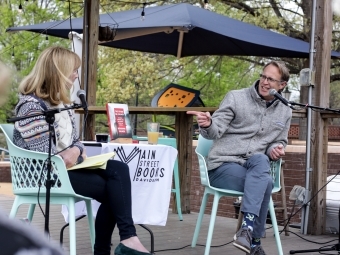
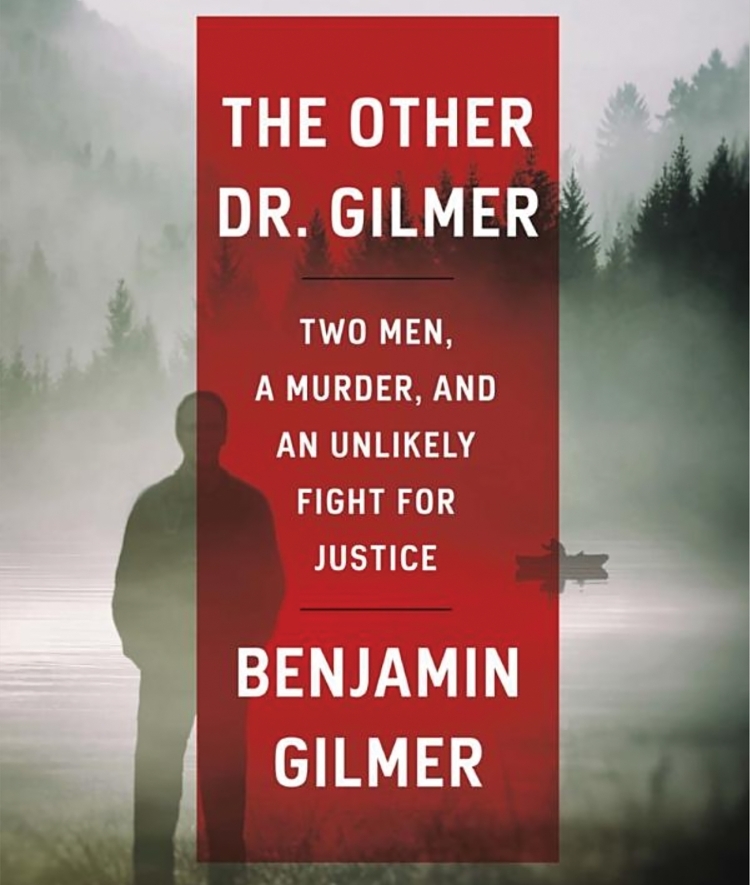
He returned to campus this spring, coupling the recruiting visit with an author event on campus and at Main Street Books in Davidson.
As a doctor, he wants to be where he’s most needed. As an author, he’s striving to expose and fix what he sees as the unconscionable warehousing of the mentally ill in America’s prisons.
“His whole career has been devoted to treating people in underserved communities,” Deirdre Smith Gilmer says. “We’re never going to be wealthy from his medical career—service is a really big component for us.”
The couple met when both taught in the summers at the N.C. Governor’s School in Winston-Salem. She was a professional modern dancer in New York and toying with the idea of moving to France.
“I had my first full conversation in French with Benjamin,” she says, “and was immediately smitten.”
Their friendship turned to dating and a marriage that’s survived medical school, residency, children and a busy doctor’s heavy workload. Not to mention the countless hours he’s spent pursuing justice for Vince, and the book he wrote to do that.
“That was definitely a hard time for our family,” Deirdre says. “Even though I love Vince and would never have asked Benjamin to give up, there have been moments of conflict. But this is who Benjamin is. As a doctor, he’s so approachable and humble with his patients, he creates relationships. He sees the whole person rather than just the problem they may be having.”
Jason Boyer, once Vince Gilmer’s patient, is now Benjamin’s.
“He’s wonderful,” the 41-year-old machinist says. “Both doctors are above and beyond excellent, they care so much. Both listen so well, you walk out of there feeling so much better, and like everything is going to be okay. That’s something you can’t say about a lot of doctors, and it’s such a comfort.”
Deirdre Smith Gilmer sees how hard Benjamin works—as an advocate for his patients—and for Vince. Through setbacks, stressful times and disappointments, he picks himself back up, she says.
“He’s always super positive and optimistic, that’s how he’s survived,” she says. “He rolls with things, and he gets over them.”
The two are active in the Asheville community. Deirdre is a yoga instructor whose practice focuses on healing. Their son Kai is now 14; and daughter, Luya, 12. The kids call Vince Gilmer “Uncle Vince.”
Schweitzer’s ghost hovers.
Schweitzer held concerts to raise money for medical equipment and care in rural, impoverished Africa. Every year the Gilmers throw a music festival in their back yard, raising money for Shoulder to Shoulder. Benjamin Gilmer’s family joins him, his MAHEC colleagues and students on the annual service trip to Honduras.
Hundreds of people attend the Gilmers’ festival. Musicians have included folk singer Sarah Lee Guthrie (Woody’s granddaughter and Arlo’s daughter) and The Chatham County Line.
“I can’t imagine with everything else he’s been involved in pulling something like that off,” says friend Mollie Harrington Weaver ’90, a pediatrician. “But Benjamin has this way of thinking.
“It’s like, ‘everything will be fine, we’ll get some food trucks and beer and call Bob Dylan to see if he’s free.’ Benjamin’s the dreamer, his mind doesn’t go to barriers, it’s always ‘why not? Do it, don’t worry about what might get in the way and just figure out how to make it happen.’”
And Vince’s mom is grateful for that.
“This whole thing has been like living in a nightmare,” Hitt says. “Dr. Ben has been a miracle to us, he has worked so hard to help Vince. He’s become part of our family.
“Vince is so glad he’s at the clinic; Vince loved his patients, and Ben is the same way,” she says. “They’re both very caring, and they both want the world to be a better place.”
Dr. Benjamin Gilmer currently serves on the NC Schweitzer Fellowship Board of Directors and was a 2002 NC Schweitzer Fellow and 2004 Lambarene Schweitzer Fellow.
